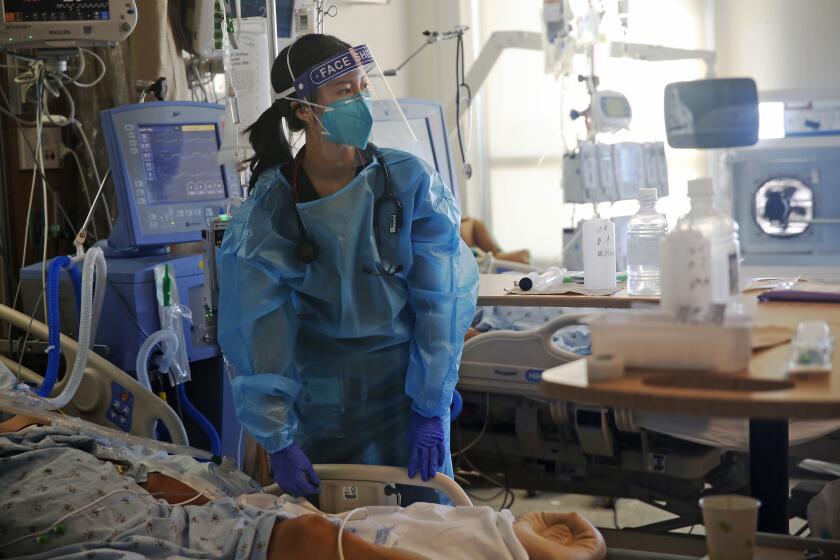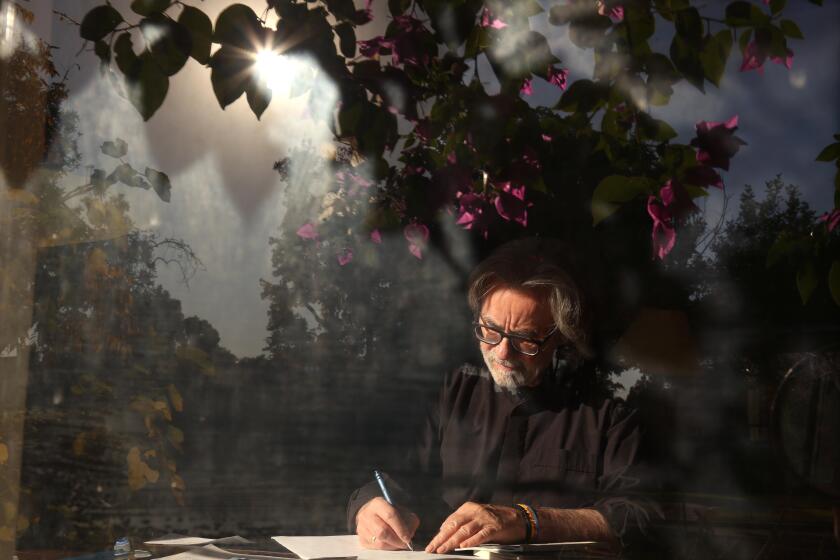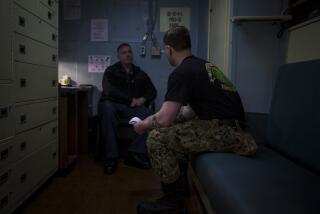Hospital chaplains embrace new role during the pandemic: caring for caregivers
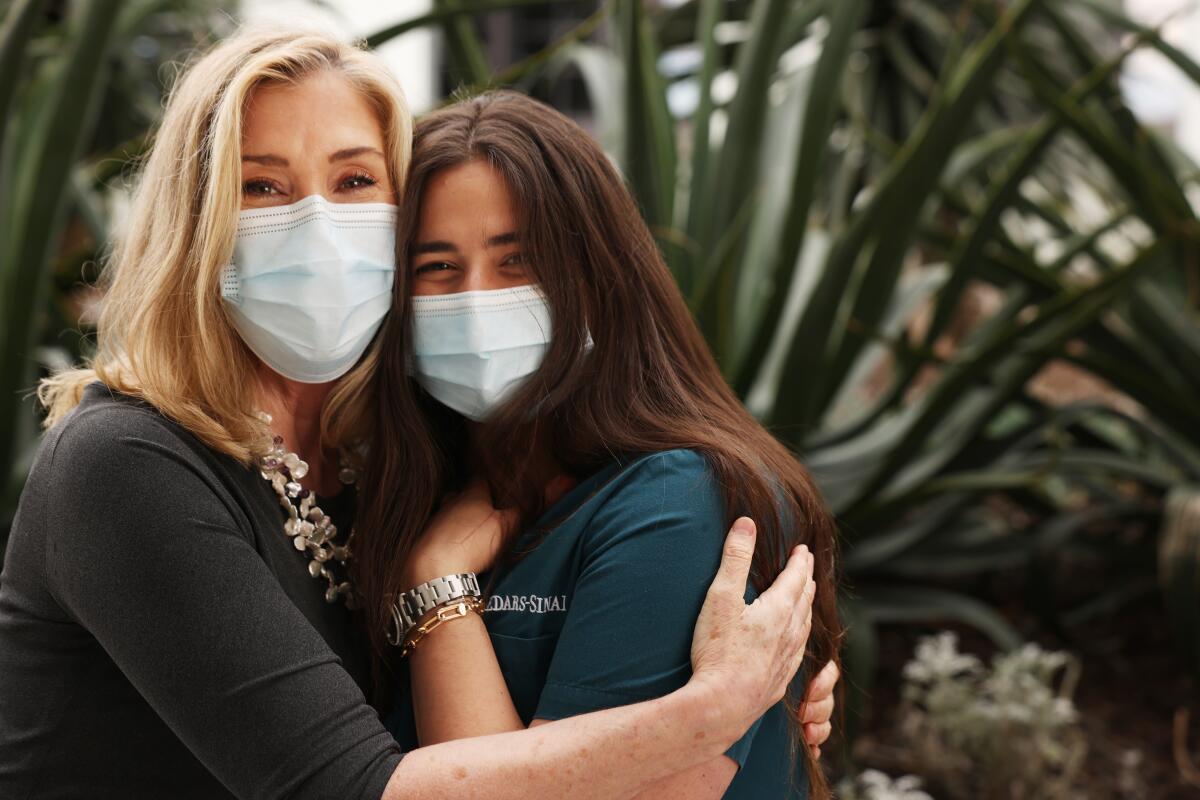
- Share via
Before entering the room of a COVID-19 patient, the Rev. Peggy Kelley dons personal protective gear — both physical and spiritual.
She pulls on a sterile gown and places a face shield over her mask. She pumps Purell into her gloved hands and holds them over her chest, checking in with her heart. With a few deep breaths, the hospital chaplain at Cedars-Sinai Medical Center sends some words heavenward:
“God, be with me. Walk with me in this room, use me, help me serve your people. Guide me. Guide my work, my hands, my eyes.”
Then she walks into the quarantine zone, hoping to provide some solace or sense of self to the suffering stranger in bed.
On a recent visit, Kelley met with a despondent patient who greeted her as she entered his room. He hadn’t spoken much to his nurse, Jillian Katz, other than to ask for a priest. Though she isn’t Catholic, Kelley offered to pray with the man, calling on God’s strength. The moment left the Catholic patient, Jewish nurse and Protestant chaplain all in tears.
“She was saying things that applied to me,” Katz said. “I was sad for him, but I was also like, ‘Please give me strength; I need all the help I can get.’ I was like, ‘Wow, I actually felt God — that was crazy!’ ”
Although hospital chaplains are primarily tasked with supporting the sick and their loved ones, the pandemic has thrust them into new territory: caring for the caregivers.
Kelley, a minister in the Congregational Church, said she is devoting more time than ever in her 15 years as a chaplain to serving burned-out healthcare workers. The holiday surge in coronavirus cases — and the ensuing record-high hospitalizations and deaths — especially weakened morale, she said.
“They’re working so hard, and they’re not forgetting what we need to do to get through this. And then when they see people not complying … they get so, ‘Oh come on, you guys, we can’t step away from this reality,’” Kelley said. “It’s very disheartening.”
For Katz and other medical staff, each day is a balancing act in clinical practice and empathy.
The 28-year-old tries to channel the mantra of her grandfather, who served as a hospital chaplain before he died two years ago: “Be a caring presence.” But to keep a distance from the life-and-death conditions she faces in the COVID-19 unit, Katz said she usually builds an emotional wall as she works.
Still, Katz often carries work home with her after long shifts, lying awake mulling over her patients and their families. A layer of guilt blankets her thoughts.
“We help the patients, but we leave at the end of the day. We’re still breathing. How can we complain?” she said.
Witnessing so much pain over the last year from the COVID-19 pandemic will likely take a major toll on healthcare workers’ mental health, experts say.
At both Cedars-Sinai and Children’s Hospital Los Angeles, chaplains offer hospital workers a respite from the bustling, beeping backdrop. They roll up to cordoned-off areas in different wards with “Tea for the Soul.”
Two by two, to accommodate social distancing, hospital staff trickle in, greeted by warm smiles and hot cups of tea. The chaplains may dim the lights or diffuse lavender-scented oils. Sometimes they set up a jar for workers to deposit their stressors, which are written on slips of paper.
“When we see that there’s a lot of stress on the unit — maybe there has been a critical case, or a lot of them — sometimes we’ll just bring up the tea cart,” said Dagmar Grefe, manager of spiritual care at Children’s Hospital. “It has become so popular that people will call us and say, ‘We have a lot going on, can you come up?’ It’s an expression of care for people who usually always care for others.”
Sue Martinez, a nurse manager at Children’s Hospital, said the presence of the chaplains is “invaluable.”
“Sometimes I’m not sure that we all recognize the magnitude that they have within the hospital walls,” she said.
At a time of greater isolation, chaplains at L.A. County jails and state prisons say there’s a greater need for their work.
Martinez recalled learning on a recent evening about the death of a longtime colleague from the medical surgical unit, where Martinez has worked for 29 years. Grefe arrived the next day at 6 a.m. with the tea cart, she said, and later organized a virtual memorial for the late nurse.
“We could use it any day here, to be honest,” Martinez said. “This work is hard, and oftentimes we don’t take breaks — a real proper break where we could unplug.
“We all love it,” she continued, noting that she usually chooses chamomile. “I don’t think there’s anyone who would turn down a cup of tea.”
Devoting so much energy to supporting others can take a toll.
Jason Weiner, senior rabbi and director of Cedars-Sinai’s Spiritual Care Department, said his caseload has tripled since the beginning of the pandemic.
One evening in December, he stayed up late helping another chaplain perform an Orthodox Jewish end-of-life ritual. Early the next morning, he was bombarded with more problems at work: navigating a family feud, processing the unexpected death of a young COVID patient and fielding complaints about observing holidays in the hospital. Then two more people died.
“Of course we question God. I don’t know how you could not,” Weiner said. “We see a lot of miracles, a lot of good things. But we see a lot of horrible things.”
To weather any tests to their faith, chaplains must lean into their beliefs that God cares.
The Rev. Jeffrey Scheer girds himself with a three-part centering routine that begins before the Lutheran chaplain sets foot in Hoag Hospital. Strengthened from an early-morning devotional, the 59-year-old prays during his roughly 12-minute commute to work each day. As he enters the hospital office in Newport Beach, his eyes land on a painting of Jesus rescuing a lost sheep, from the biblical parable of the good shepherd.
“I always look at that and say, OK, that’s a good reminder because how often can I be the sheep” that needs saving, Scheer said. “And sometimes, I’m being that shepherd that’s trying to find someone else.”
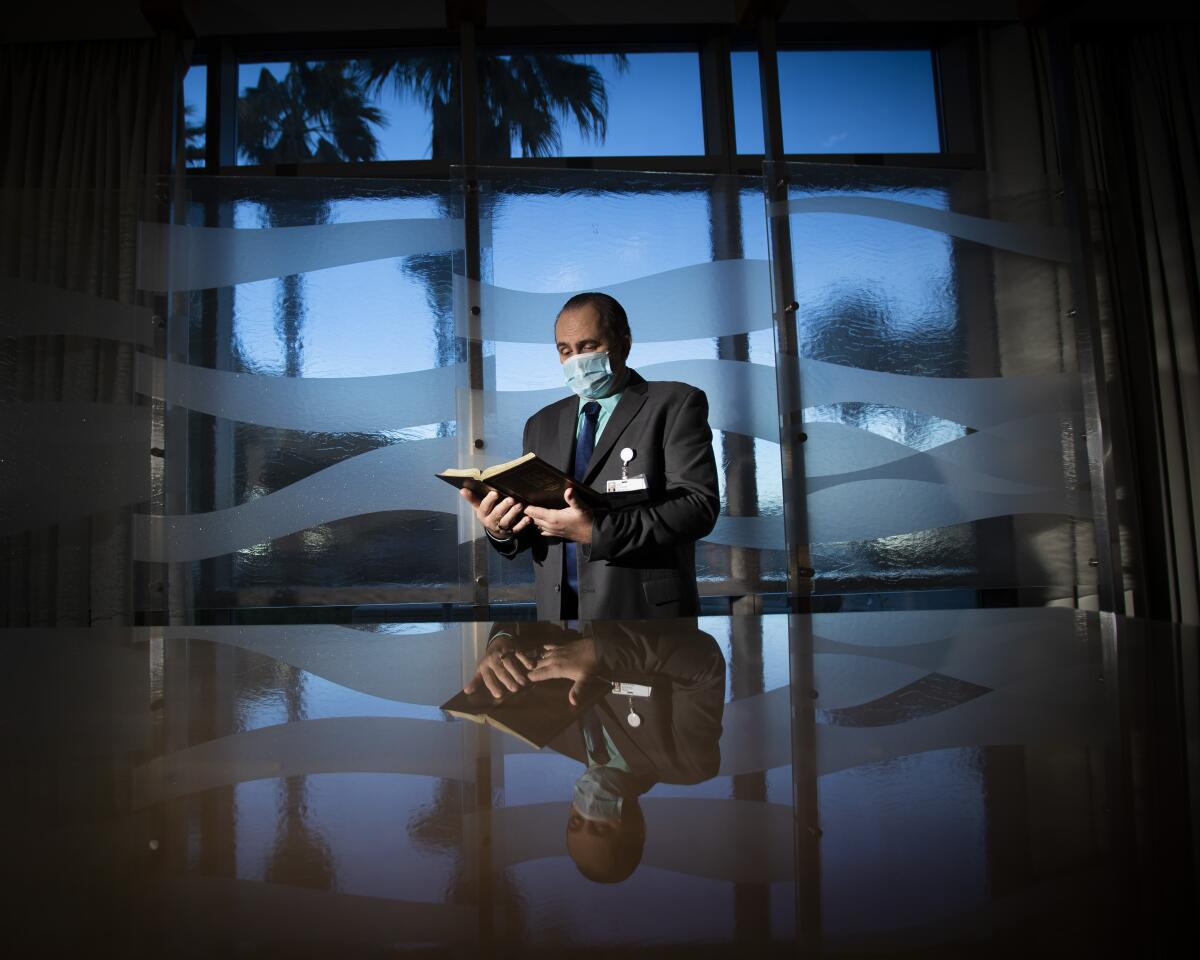
As some of the hidden helpers on the front lines of the battle against COVID-19, chaplains shore up support for an overstretched healthcare system — all while navigating the throes of the capricious coronavirus themselves.
“That’s what we signed up for,” Weiner said. “We’re here for hard times.”
To cope, they often return to their own advice: sharing concerns with colleagues and taking a moment to recenter themselves. Weiner runs in the morning and sometimes blasts a favorite Hebrew song at home or in his car, praising God as good. Kelley practices reiki, a Japanese form of alternative medicine known as energy healing.
“It’s really beautiful that we can ignore all the societal standards and just be able to lean on each other. Spirituality doesn’t have to be about the specifics of religion. It’s just about how we’re all connected — [and] there for each other.”
— Jillian Katz, a Cedars-Sinai nurse
Through it all, the chaplains must summon their spiritual strength to provide the same to others.
On one particularly tough day at Cedars-Sinai, the words of a COVID-19 patient in his 90s tumbled around nurse Katz’s mind: “This is the worst day of my entire life.” Katz was reaching her breaking point. Then Kelley approached “with her kind eyes” and asked how she was doing.
“It was nice to speak to someone about it, even if it was briefly for two minutes,” Katz said. “It seemed like she really cared.”
The nurse started a support session among her colleagues to share encouragement through group text messages. Her manager checks in regularly. When she’s off work, Katz decompresses by spending time with her husband and toddler. “You lean on everything that you can,” she said.
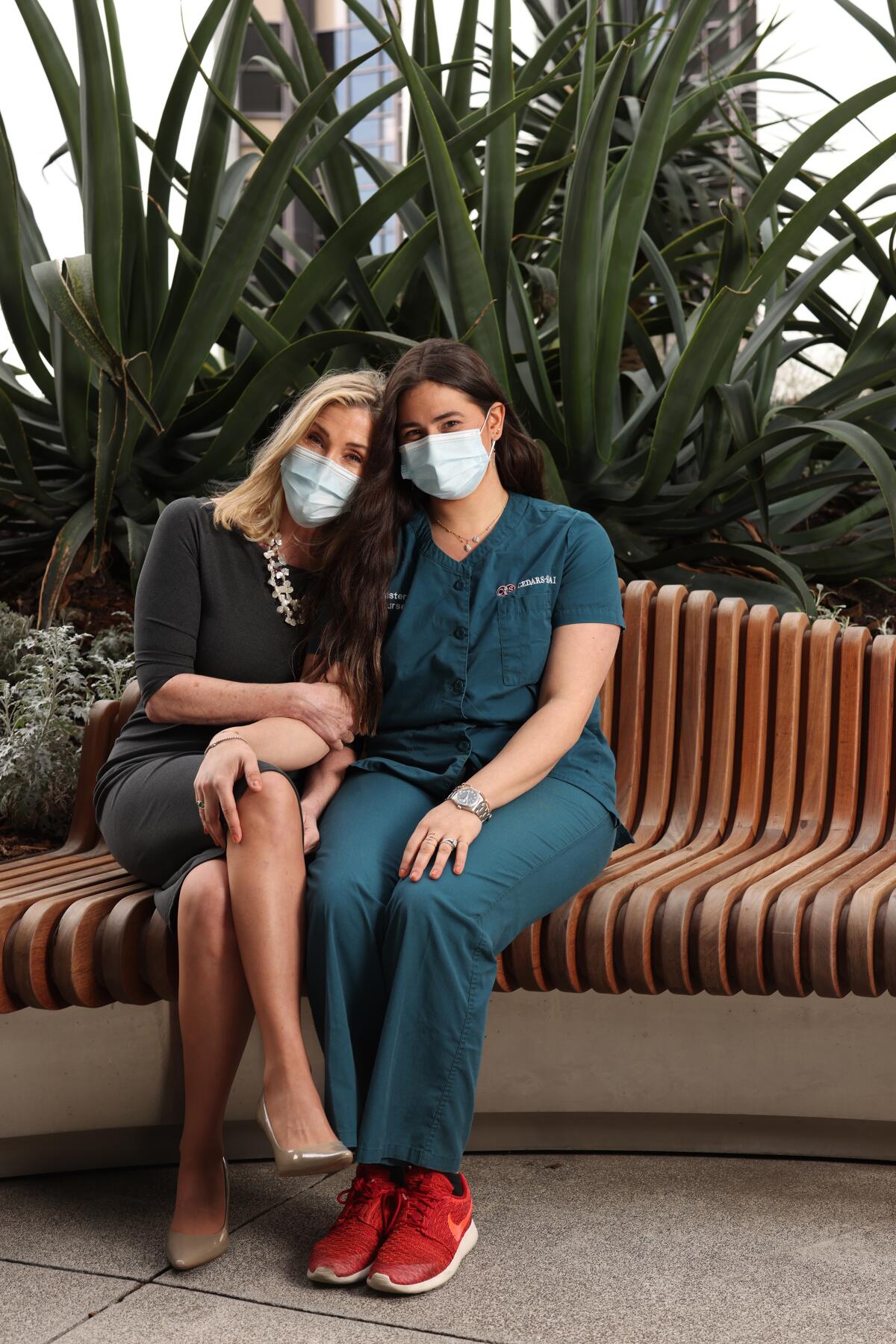
But the pandemic still permeates her emotional wall. Since their first interaction, Katz said Kelley regularly checks on her, often reminding the nurse how proud her chaplain grandfather would be of her work.
An Orthodox Jew, Katz hadn’t expected to be drawn to a Christian chaplain. But Kelley reminds her of God’s presence, and their close connection has strengthened Katz’s relationship with God.
“It’s really beautiful that we can ignore all the societal standards and just be able to lean on each other,” Katz said. “Spirituality doesn’t have to be about the specifics of religion. It’s just about how we’re all connected — [and] there for each other.”
A strengthened healthcare staff and caring chaplains means patients benefit, too. Katz said patients perk up after the chaplains’ visits, reminded of God’s love and the feeling “that they’re in good hands.”
As hospitalizations for COVID-19 decline, for Katz and Kelley and so many others, the work continues. So do their routines.
Each time Kelley leaves a COVID-19 patient’s bedside, she practices her wind-down ritual, removing each layer of PPE and praying once again.
This time, she asks God to stay in the room.
More to Read
Sign up for Essential California
The most important California stories and recommendations in your inbox every morning.
You may occasionally receive promotional content from the Los Angeles Times.
